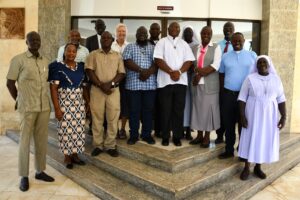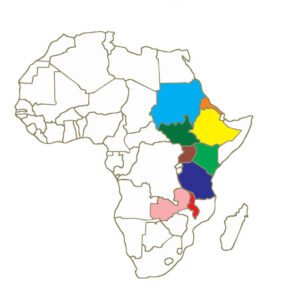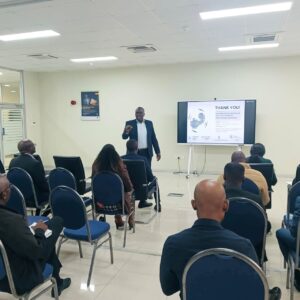UGANDA: Caritas Internationalis Coordinator visits S. Sudanese Refugees’ Camps in the Country
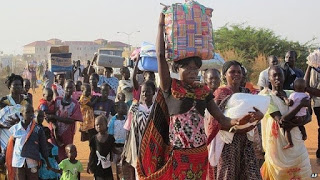
S. Sudanese refugee women cross over Ugandan border last year following the war
The Emergency Response Officer of Caritas Internationalis, John Coughlin is currently visiting Uganda from 2nd, – 9th February, 2017.
Coughlin’s visit is intended to allow the donors and sponsors from various confederation members that support Caritas Uganda in the Emergency Refugee Project, to better understand the challenges facing South Sudan and to assess the situation of the South Sudanese refugees living in the country.
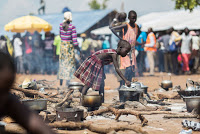
the camp as others queue for donor food
The South Sudanese refugees were forced to flee their country following the resumption of war between forces loyal to President Salvar Kiir and Opposition leader Riek Machar in July, 2016. According to UNCHR, a total of 237,270 South Sudanese refugees arrived in Uganda between 7th, July and 21st, October, 2016.
“When we made an appeal to Caritas Internationalis for support of the South Sudanese refugees living in Uganda following the war, Coughlin received our proposals and sent to all the 124 confederation members. He pushed for our support and about eight members came on board,” the Director of Caritas Uganda and the vice president of Caritas Africa, Msgr Francis Ndamira said. He added that, “His presence at the refugee camp will enable him to assess the situation of the refugees on ground.”
Msgr Ndamira also said that Coughlin’s visit is a follow-up on how Caritas Uganda has implemented the Emergency Response Project since its implementation in October last year in a bid to assist over 3000 South Sudanese refugees and the host community living in and around Bidibidi Refugee Camp in Yumbe District (Northern region of Uganda) enhance food security and livelihoods.
“The project supports these refugees through food production and non-agricultural income generation including offering training in technical courses such as catering, tailoring, metal fabrication, hair dressing and beauty and motor vehicle mechanic among others to help them become self-reliant and to strengthen their socio-economic resilience,” he explained.
During his week-long visit, Coughlin is also expected to meet with Rt. Rev Sabino Ocan Odoki, the Bishop of Arua Diocese, the project coordinator of Caritas Uganda and representatives from the Office of the Prime Minister (OPM) and UNHCR at both national and diocesan level. He will also hold respective meetings with local government officials in Yumbe District and emergency Appeal field staff. He will later depart for Ethiopia on 9th, February, 2017

border last year following the war
Meanwhile, according to the latest statistics released by the Government of Uganda, Refugee Information Management System (RIMS), Uganda currently hosts about a half a million refugees residing in nine rural settlements. The report further states, “the influx of refugees from South Sudan continues at an average rate of 2,000-2,500 individuals per day.” Majority of the refugees originate from the Equatoria region of South Sudan and belong to a variety of ethnic groups including Kakwa, Kuku, Madi, Didinga, Acholi, Zande and Bari among others.
Refugees have frequently spent many days in the bush hiding from armed groups and travelling on foot to reach the border with Uganda. With limited access to food, water and other needs. Caritas Uganda, UNHCR, OPM and other partners ensures that refugees arriving at official and unofficial border points are quickly transported to Bidibidi (or a collection Point) where access to reception facilities (water, food, shelter and medical attention / nutritional screening) is provided.
∽End∽
By Jacinta W. Odongo
